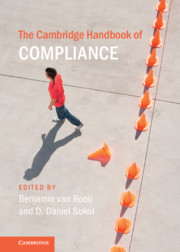Book contents
- The Cambridge Handbook of Compliance
- The Cambridge Handbook of Compliance
- Copyright page
- Contents
- Figures
- Tables
- Contributors
- 1 Introduction: Compliance as the Interaction between Rules and Behavior
- Part I Compliance Concepts and Approaches
- Part II Deterrence and Incapacitation
- Part III Incentives
- Part IV Legitimacy and Social Norms
- Part V Capacity and Opportunity
- Part VI Compliance and Cognition
- Part VII Management and Organizational Processes
- Part VIII Measuring and Evaluating Compliance
- 48 Laboratory Experiments
- 49 Compliance Experiments in the Field: Features, Limitations, and Examples
- 50 Naming and Shaming: Evidence from Event Studies
- 51 Validity Concerns about Self-Reported Surveys on Rule Compliance
- 52 Factorial Surveys and Crime Vignettes
- 53 Qualitative Methods and the Compliance Imagination
- 54 Policy Evaluation
- Part IX Analysis of Particular Fields
- References
50 - Naming and Shaming: Evidence from Event Studies
from Part VIII - Measuring and Evaluating Compliance
Published online by Cambridge University Press: 07 May 2021
- The Cambridge Handbook of Compliance
- The Cambridge Handbook of Compliance
- Copyright page
- Contents
- Figures
- Tables
- Contributors
- 1 Introduction: Compliance as the Interaction between Rules and Behavior
- Part I Compliance Concepts and Approaches
- Part II Deterrence and Incapacitation
- Part III Incentives
- Part IV Legitimacy and Social Norms
- Part V Capacity and Opportunity
- Part VI Compliance and Cognition
- Part VII Management and Organizational Processes
- Part VIII Measuring and Evaluating Compliance
- 48 Laboratory Experiments
- 49 Compliance Experiments in the Field: Features, Limitations, and Examples
- 50 Naming and Shaming: Evidence from Event Studies
- 51 Validity Concerns about Self-Reported Surveys on Rule Compliance
- 52 Factorial Surveys and Crime Vignettes
- 53 Qualitative Methods and the Compliance Imagination
- 54 Policy Evaluation
- Part IX Analysis of Particular Fields
- References
Summary
Abstract: A firm’s ‘reputation’ reflects the expectations of its partners of the benefits of trading with it in the future. An announcement by a regulator that a firm has engaged in misconduct may be expected to impact negatively on trading parties’ (i.e. consumers or investors) expectations for a firm’s future performance, and hence on its market value. How can we identify reputational losses from share price reactions? How large are these losses for different types of misconduct? The chapter seeks to answer the above questions in the light of recent empirical evidence and draws implications for regulatory enforcement policy.
- Type
- Chapter
- Information
- The Cambridge Handbook of Compliance , pp. 748 - 760Publisher: Cambridge University PressPrint publication year: 2021



